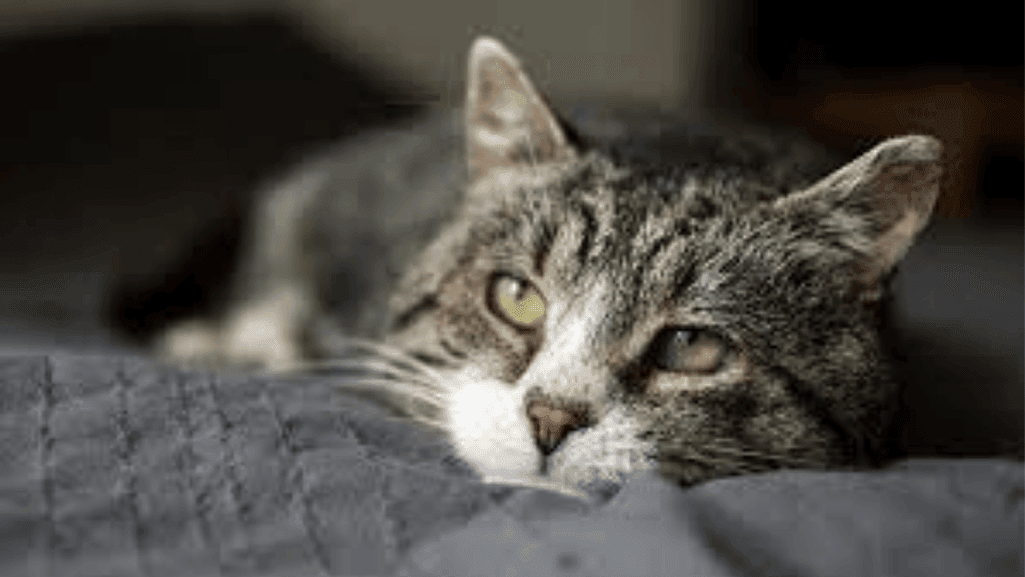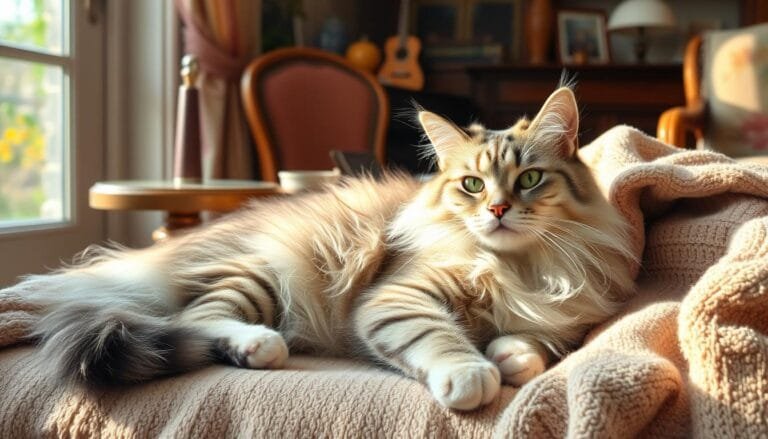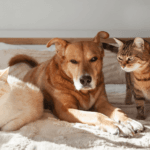As cats live longer thanks to better vet care and food, more face age-related brain changes. Cat dementia, or cognitive dysfunction syndrome (CDS), is now common in older cats. It’s key to spot these signs to care for your aging pet well.
About 36% of cats between 11 and 21 years old have feline dementia. By age 15, 50% of cats show signs of brain decline. Any cat can get CDS, but cats around 10 years old may start showing symptoms like memory loss and confusion.
Spotting cat dementia can be hard because the signs are often small or seem like normal aging. Look out for changes in how they interact, sleep, and even anxiety. If you see these signs, talk to your vet to get your cat checked and learn how to manage their condition.
Key Takeaways
- Cognitive dysfunction syndrome (CDS) affects many senior cats over the age of 10.
- Common cat dementia signs include disorientation, changes in sleep patterns, and altered social interactions.
- Early recognition of cognitive decline is key for the best care for aging cats.
- Regular vet visits can help spot and manage age-related health issues in senior cats.
- Making lifestyle changes and adjusting their environment can help cats with dementia live better.
Understanding Feline Cognitive Dysfunction Syndrome
As cats get older, they might face a condition called feline cognitive dysfunction syndrome (CDS). This affects their mental health and behavior. It’s often called cat dementia or cat senility and is common in older cats.
What is Cat Dementia?
Cat dementia, or cognitive dysfunction, impacts a cat’s memory and behavior. It’s like Alzheimer’s in humans. It happens when the brain ages and neurons die, affecting memory and behavior.
This mental decline can cause confusion and changes in behavior. Cats may seem lost or disoriented.
The brain’s part that controls environment response and basic functions is hit hard. Cats may show signs like spatial disorientation and lack of interest in play. They might sleep a lot, stare blankly, or ignore food and water.
Prevalence of Dementia in Senior Cats
Dementia is common in older cats. Over a quarter of cats between 11 and 14 show signs. As cats get older, more show signs of cognitive decline.
About 94 million cats live in U.S. homes, up from 85 million in 2016, says the American Pet Products Association (APPA). Cats live longer due to better care, nutrition, and vet medicine. Some cats live as long as 96 to 100 in human years.
While there’s no cure for cognitive dysfunction, its signs can be managed. Changes in environment, diet, and drugs can help. Knowing about feline cognitive dysfunction syndrome helps cat owners support their senior cats’ mental health.
Common Signs and Symptoms of Cat Dementia
As cats get older, they may start to forget things. This is called feline cognitive dysfunction (FCD). It’s common in cats over 11 years old. Knowing the signs of cat dementia helps us care for our older cats better.
Disorientation and Confusion
One big sign is when cats get lost in places they know. They might wander around or stare at walls for a long time. At least 40% of cats over 17 years old show this sign early.
Changes in Sleep Patterns
Older cats might sleep less and wake up more at night. They might also meow a lot, which can mean they’re anxious or confused. These changes can affect their sleep patterns.
Altered Social Interactions
As dementia gets worse, cats may pull away from people. They might seem less interested in playing or cuddling. These changes can start small but get bigger over time.
House Soiling and Litter Box Issues
Older cats might have trouble using the litter box. This is a common reason for them to see behaviorists. It could mean they’ve forgotten where the litter box is. But, it’s important to check for other health problems too.
Recognizing the signs of cat dementia is the first step in providing the best possible care for your senior feline companion.
Other signs include forgetting commands or not remembering they’ve eaten. Changes in appetite or thirst are also signs. If you see these in your cat, talk to your vet to find out why and how to help.
Diagnosing Cat Dementia
As cats get older, it’s key to know the signs of dementia. This condition, also known as cognitive dysfunction syndrome (CDS), can start in cats around 10 years old. Catching it early is important to help your cat live better.
It’s hard to diagnose cat dementia because its symptoms can look like other health problems. Vets use a process of elimination to figure out if it’s CDS. They might do a physical check, blood tests, and other tests to rule out other issues.
Ruling Out Other Health Conditions
Before thinking it’s dementia, see your vet to check for other health problems. Some issues that can seem like dementia include:
- Hyperthyroidism
- Hypertension
- Chronic kidney disease
- Arthritis
Your vet will do a full check-up, blood tests, and other tests to find out what’s causing your cat’s behavior changes. It’s vital to treat these conditions quickly to avoid serious problems.
Cognitive Dysfunction Checklist for Cats
If other health issues are ruled out, your vet might use a checklist for dementia. Look out for these signs:
- Disorientation and confusion
- Changes in sleep patterns
- Altered social interactions
- House soiling and litter box issues
- Increased vocalization
- Loss of interest in playing
- Loss of appetite
- Lack of grooming
There’s no cure for cat dementia, but early action can help. If you see any signs of confusion or changes in your cat’s behavior, talk to your vet. They can help improve your cat’s life.
Managing and Treating Feline Dementia
There’s no cure for feline dementia, but there are ways to manage it. Early diagnosis is key. It helps manage the condition and improve your cat’s life.
For cat dementia, treatments include medicines like selegiline hydrochloride (Anipryl/Selgian) and propentofylline. SAM-e supplements are also used. These help with brain function and support the liver. maxxiSAMe is a special SAM-e formula for aging cats.
Changing the environment can also help. Rearrange items and use toys and puzzles. A consistent routine helps too. A balanced diet with fatty acids and antioxidants is also important.
“Regular health check-ups are recommended for cats with dementia to monitor their overall well-being and detect any issues early on.”
Regular vet visits are important. They help monitor your cat’s health and catch problems early. Your vet can tailor a treatment plan for your cat.
With the right medicines, diet, and care, you can improve your cat’s life. Be patient and proactive. This way, you can help your cat stay comfortable and happy.
Creating a Comfortable Environment for Cats with Dementia
As cats get older, they may face cognitive decline and dementia. This can lead to confusion, restlessness, and vocalization at night. It’s important to create a supportive space for them. Here are some tips to help your senior cat during this time.
Maintaining a Consistent Routine
Cats with dementia love routine. Keep their feeding, play, and grooming times the same every day. This makes them feel safe and less anxious.
Providing Mental Stimulation and Enrichment
Keeping your senior cat’s mind sharp is key. Use interactive toys, food puzzles, and games to keep them engaged. Here are some ideas for enrichment:
- Puzzle feeders and treat dispensers
- Clicker training sessions
- Scent exploration with cat-safe herbs
- Bird watching from a window perch
Adapting the Home for Accessibility and Safety
As cats age, they may move slower and see less clearly. Make your home safe and comfortable for them:
- Install night lights for better navigation in dark.
- Provide ramps or stairs for easy access to high spots.
- Make sure litter boxes are easy to reach, using bigger or shallower ones if needed.
- Set up cozy spots in quiet, warm areas of your home.
Being patient and understanding is vital when caring for a cat with dementia. They may have accidents or get confused. But with love and support, they can get through this tough time. If your cat’s behavior or health changes, see your vet. They can check for medical issues and offer more cat dementia prevention tips.
Aging is not lost youth but a new stage of opportunity and strength. – Betty Friedan
By creating a comfortable, enriching space and sticking to a routine, you can help your senior cat age well and manage dementia symptoms.
cat dementia signs
As our feline friends get older, it’s important to notice small changes. These changes might mean cat dementia is starting. Spotting these signs early can help you care for your senior cat better. Here are some key signs to watch for:
Early Warning Signs of Cognitive Decline in Cats
Some early signs of feline senility include:
- Changes in social interactions, such as becoming more needy, reactive, or aloof
- Altered sleep cycles, with increased activity at night
- Disorientation or getting lost in familiar surroundings
- Appetite changes in senior cats, such as decreased interest in food
- House soiling or litter box issues
Behavioral Changes to Watch For
As cat dementia gets worse, you might see more changes. These include:
- Reduced grooming and self-care
- Increased vocalization, specially at night
- Staring into space or at walls
- Memory issues, such as forgetting commands or where food bowls are
It’s key to remember that these changes can also mean other health issues. So, always check with your vet for a correct diagnosis.
When to Consult Your Veterinarian
If you see any of these signs or changes in your senior cat, it’s time to see your vet. They can check for other health problems and make a plan for dementia. Early action and care can really help your cat live better and slow down dementia.
Remember, you are your cat’s best advocate. By staying alert and knowing the signs of cat dementia, you can make sure your cat ages well.
Conclusion
As our feline friends get older, it’s key to know the signs of cat dementia. About a quarter of cats between 11 to 15 years old show signs of cognitive decline. And, nearly half of cats over 15 years old have dementia symptoms. Spotting these early and managing them is vital for your senior cat’s happiness.
There’s no cure for feline dementia, but treatments can slow it down and improve your cat’s life. Supplements like antioxidants, SAM-E, and omega-3 and -6 fatty acids can help. Your vet might also suggest prescription diets with MCTs or off-label drugs like Selegiline and Propentofylline to ease symptoms.
Medical care is just part of the solution. Creating a safe and loving home is also key. Keep a regular routine, offer mental challenges, and make your home easy to navigate. With your vet’s help and lots of love, you can help your aging cat live well. This ensures they enjoy their golden years to the fullest.













